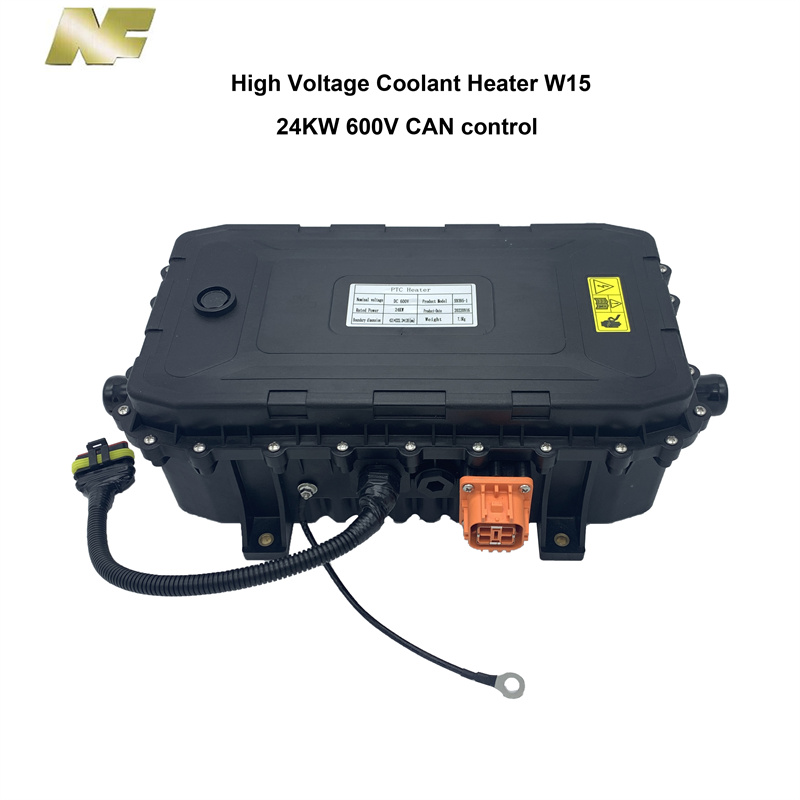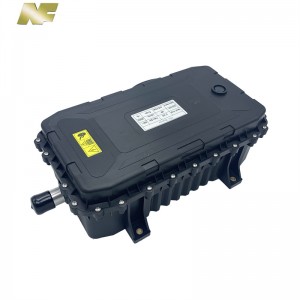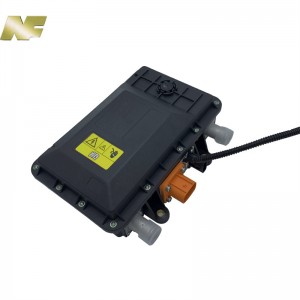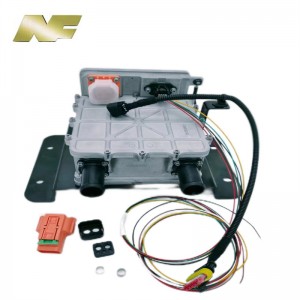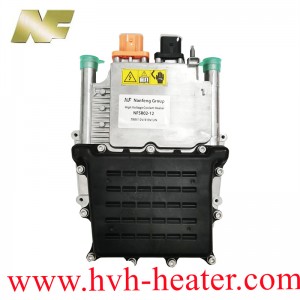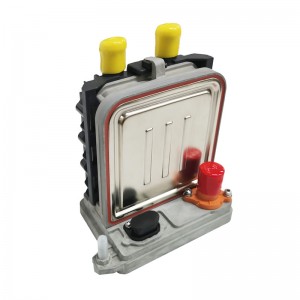NF W15 24KW HVH Electric Heater For Mini Electric Bus
Description
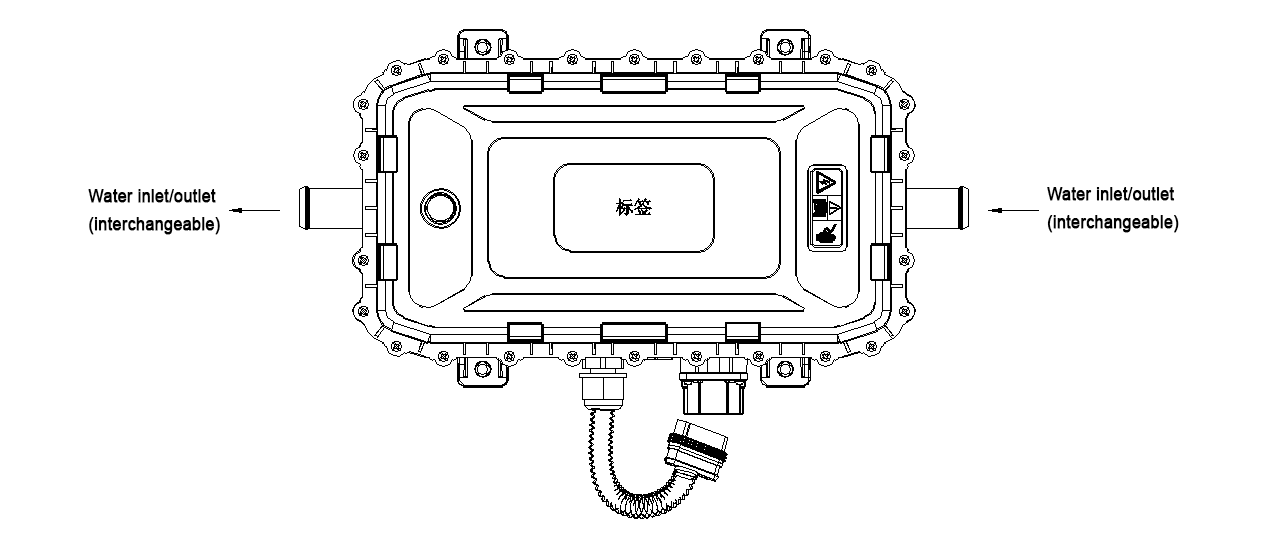
In modern automotive engineering, the integration of high-voltage systems is increasingly prevalent. High voltage Coolant heaters (HVCH) are an important component in these systems. These advanced heating solutions play a key role in ensuring efficient and reliable operation of various automotive systems, especially electric and hybrid vehicles. This article explores the significance of HVCHs in automotive applications, focusing on their functionality, benefits, and impact on overall vehicle performance.
HVHs, also known as high-voltage coolant heaters, are designed to provide supplemental heating to electric and hybrid vehicle systems that rely on high-voltage power sources. Unlike conventional heaters that rely on internal combustion engines, HVCHs are powered by high-voltage battery packs, making them indispensable in electrified vehicle architectures. These heaters are responsible for warming the vehicle’s coolant, thereby maintaining optimal thermal conditions for key systems such as the battery, power electronics, and cabin climate control.
A primary function of HVCHs is to maintain the high-voltage battery within its ideal temperature range. Battery performance is highly dependent on stable and moderate thermal conditions, and HVCHs play a crucial role in achieving this balance. By actively regulating battery temperature, these heaters enhance efficiency, performance, and service life—directly contributing to extended driving range and system durability.
Beyond battery management, HVCHs are also vital for maintaining optimal operating temperatures in power electronics. These components govern the vehicle’s electrical systems and are sensitive to thermal variations. HVCHs ensure thermal stability, thereby improving reliability and prolonging the lifespan of electronic modules.
Technical Parameter
| Parameter | Description | Condition | Minimum value | Rated value | Maximum value | Unit |
| Pn el. | Power | Nominal working condition:
Un = 600 V Tcoolant In= 40 °C Qcoolant = 40 L/min Coolant=50:50 |
21600 | 24000 | 26400 | W |
| m | Weight | Net weight (no coolant) | 7000 | 7500 | 8000 | g |
| Toperating | Work temperature (environment) | -40 | 110 | °C | ||
| Tstorage | Storage temperature (environment) | -40 | 120 | °C | ||
| Tcoolant | Coolant temperature | -40 | 85 | °C | ||
| UKl15/Kl30 | Power supply voltage | 16 | 24 | 32 | V | |
| UHV+/HV- | Power supply voltage | Unrestricted power | 400 | 600 | 750 | V |
Product Size
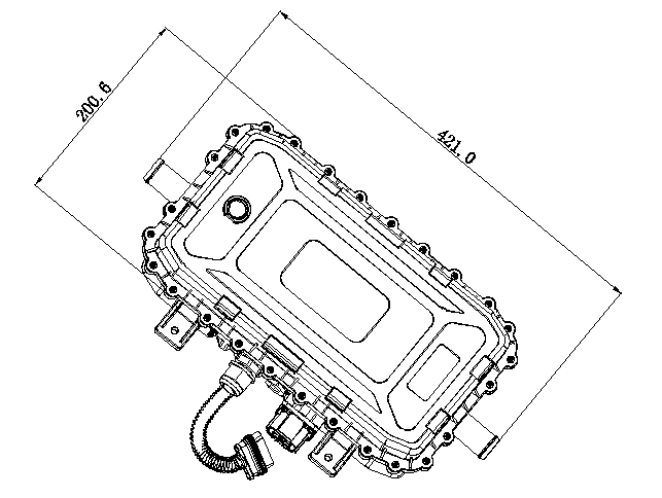
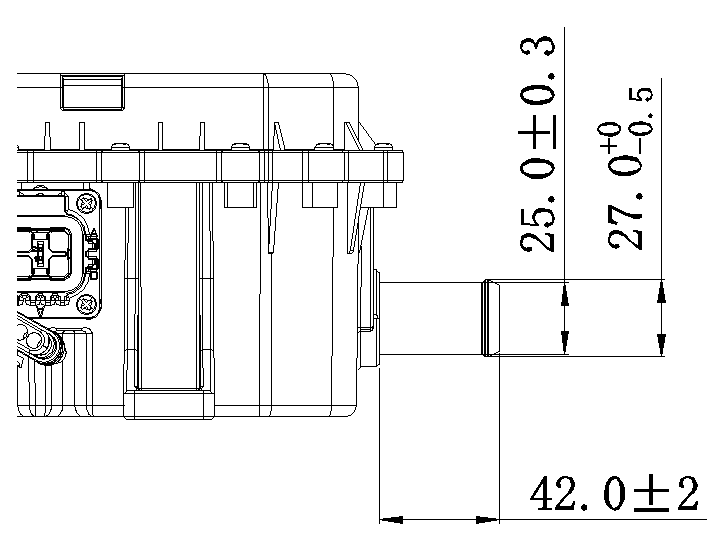
Advantage
1. Design life expectancy of 8 years or 200,000 kilometers.
2. Total accumulated heating time over the lifecycle may reach up to 8,000 hours.
3. Under continuous power supply, the heater can operate for up to 10,000 hours (communication status indicates active operation).
4. Capable of withstanding up to 50,000 power on/off cycles.
5. The heater can be continuously connected to low-voltage power throughout its service life. (Typically, when the battery is not fully discharged, the heater will enter sleep mode after the vehicle is turned off.)
6. High-voltage power is supplied to the heater when the vehicle heating mode is activated.
7. The heater may be installed in the engine compartment, but must be positioned at least 75 mm away from continuously heat-generating components where temperatures exceed 120 ℃.
Application

CE certificate
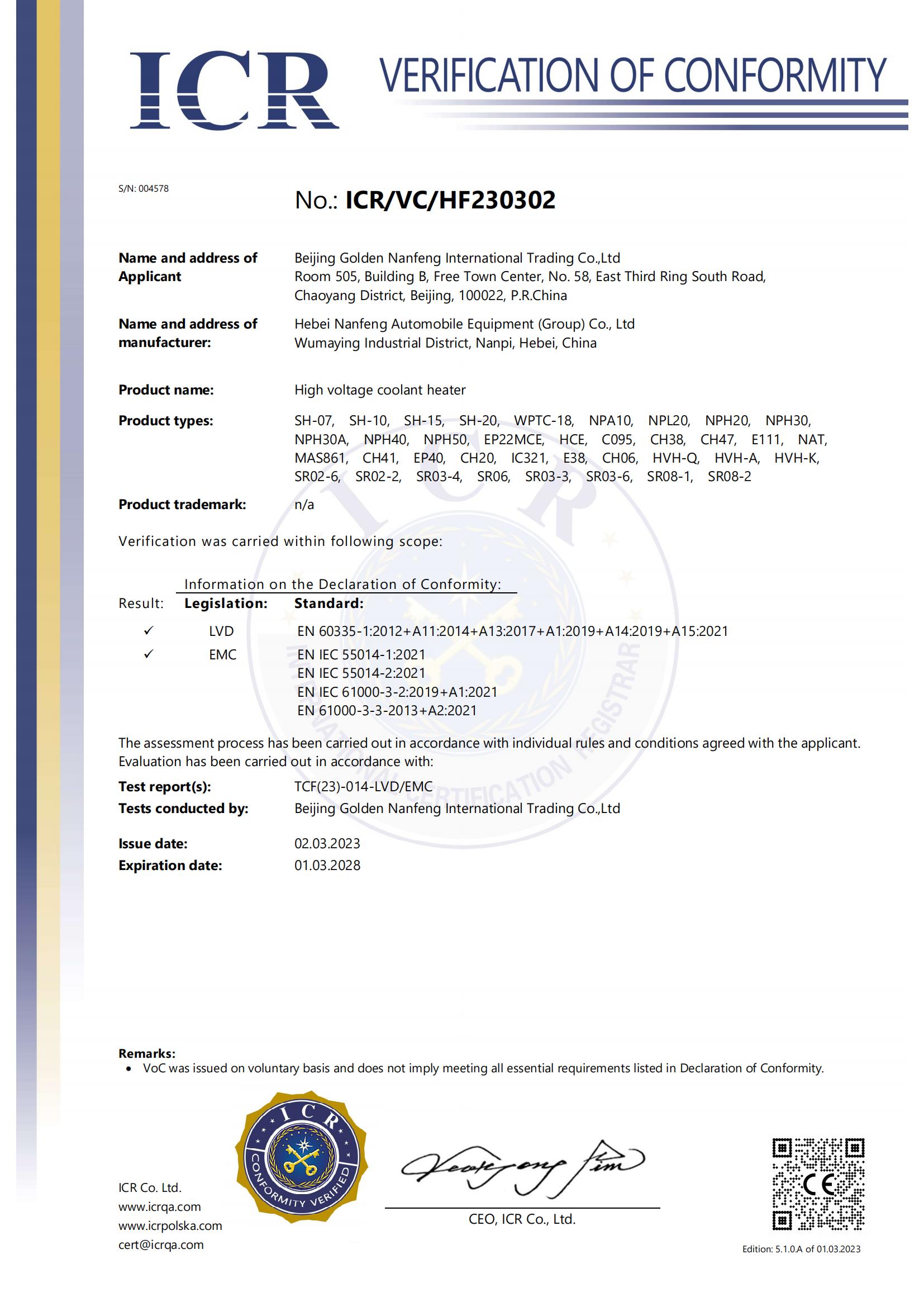
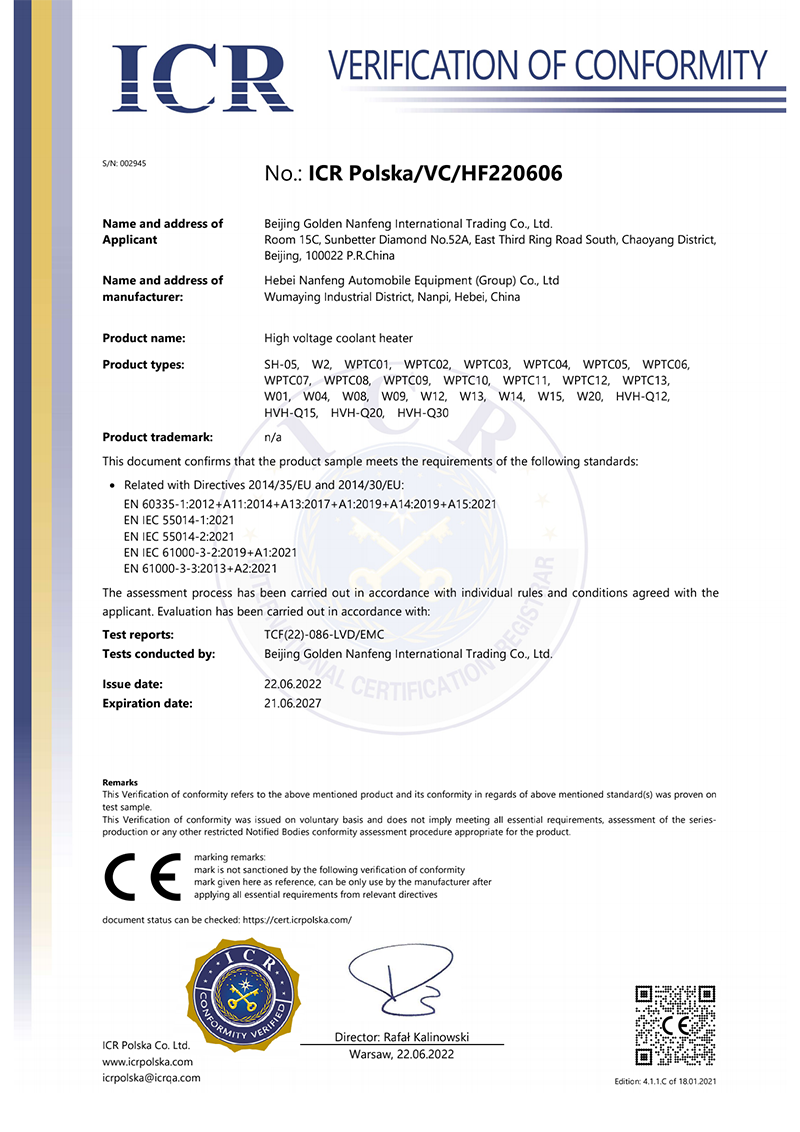
Company Profile


Hebei Nanfeng Automobile Equipment (Group) Co., Ltd is a group company with 5 factories, that specially produce parking heaters, heater parts, air conditioner and electric vehicle parts for more than 30 years. We are the leading auto parts manufacturers in China.
Our factory's production units are equipped with high tech machineries, strict quality,control testing devices and a team of professional technicians and engineers endorsing the quality and authenticity of our products.
In 2006, our company has passed ISO/TS16949:2002 quality management system certification. We also bagged the CE certificate and Emark certificate making us among the only few companies in the world acquiring such high level certifications.
Currently being the largest stakeholders in China, we hold a domestic market share of 40% and then we export them around the globe particularly in Asia, Europe and Americas.
Meeting the standards and demands of our customers have always been our top priority. It always encourages our experts to continuously brain storm, innovate, design and manufacture new products, impeccably suitable for the Chinese market and our customers from every nook of the world.
FAQ
1. What is an EV high-voltage heater in automotive technology?
An EV high-voltage heater is a heating system designed specifically for electric vehicles to provide passenger comfort in cold conditions. It operates using the vehicle’s high-voltage battery and does not rely on an internal combustion engine.
2. How does the EV high-voltage heater work?
The heater uses electricity from the vehicle’s battery to power a heating element, which warms the air inside the cabin. It delivers fast, consistent heat efficiently and independently of a traditional engine.
3. What are the benefits of using an EV high-voltage heater?
EV high-voltage heaters offer lower energy consumption, faster heating, and zero emissions or engine noise. They enhance comfort and support eco-friendly driving.
4. Are there any safety hazards with EV high-voltage heaters?
These heaters are built with safety features and tested for reliability. However, due to their high-voltage nature, they should only be handled by trained professionals to avoid electrical risks.
5. Can the EV high-voltage heater be retrofitted to existing electric vehicles?
Some EV high-voltage heaters may be compatible with existing models as aftermarket upgrades. Always consult the manufacturer or a qualified technician to confirm compatibility and installation requirements.
6. How does the EV high-voltage heater affect electric vehicle range?
While it uses battery power, modern heaters are energy-efficient and minimize range loss. They also reduce the need to draw heat from the main battery, preserving driving range in cold weather.
7. What maintenance is required for EV high-voltage heaters?
Regular checks of electrical connections, heating elements, and system performance are recommended to ensure reliable operation and early detection of issues.
8. Can the EV high-voltage heater be used with other heating systems?
Yes, in some vehicles, it can work alongside systems like heat pumps to provide comprehensive climate control tailored to driving conditions.
9. Are there different types of EV high-voltage heaters available?
Various designs are available, each suited to specific EV models and performance needs. Differences may include heating capacity, energy use, and integration with vehicle systems.
10. How does the EV high-voltage heater contribute to overall vehicle performance?
It enhances comfort and usability in cold climates, providing efficient heating without an engine. This supports the adoption of electric vehicles as sustainable transportation solutions.

